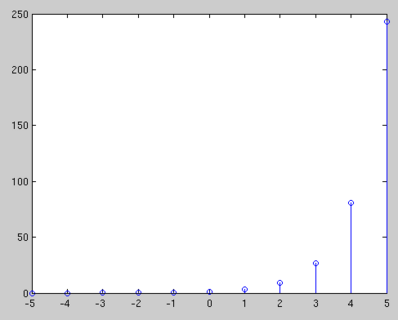| Line 81: | Line 81: | ||
<br> | <br> | ||
| − | :<span style="color:red"> TA's comment: You could just use geometric series to calculate the summation in step 4, and dont'need to change variable. ROC | + | :<span style="color:red"> TA's comment: You could just use geometric series to calculate the summation in step 4, and dont'need to change variable. ROC means region of CONVERGENCE. So ROC should be|z|>3.</span> |
=== Answer 3 === | === Answer 3 === | ||
Revision as of 10:01, 20 September 2013
< m'a't'h > In's'e'r't'f'o'r'm'u'l'a'h'e'r'</math>
Contents
Practice Problem on Z-transform computation
Compute the compute the z-transform (including the ROC) of the following DT signal:
$ x[n]=3^n u[n+3] \ $
(Write enough intermediate steps to fully justify your answer.)
You will receive feedback from your instructor and TA directly on this page. Other students are welcome to comment/discuss/point out mistakes/ask questions too! No need to write your name: we can find out who wrote what by checking the history of the page.
Answer 1
alec green
$ X(z) = \sum_{n=-\infty}^{+\infty} x[n]z^{-n} $
$ = \sum_{n=-3}^{+\infty} 3^{n}z^{-n} $
$ = \sum_{n=-3}^{+\infty} (\frac{3}{z})^{n} $
Let k = n+3:
$ = \sum_{k=0}^{+\infty} (\frac{3}{z})^{k-3} $
Using the geometric series property:
$ X(z) = \left\{ \begin{array}{l l} (\frac{z}{3})^3 \frac{1}{1-\frac{3}{z}} & \quad |z| > 3\\ \text{diverges} & \quad \text{else} \end{array} \right. $
Answer 2
Muhammad Syafeeq Safaruddin
x[n] = 3nu[n + 3]
$ X(z) = \sum_{n=-\infty}^{+\infty} x[n] z^{-n} $
$ X(z) = \sum_{n=-\infty}^{+\infty} 3^n u[n+3] z^{-n} $
$ X(z) = \sum_{n=-3}^{+\infty} 3^n z^{-n} $
$ X(z) = \sum_{n=-3}^{+\infty} (\frac{3}{z})^{n} $
Let k = n+3, n = k-3
$ X(z) = \sum_{k=0}^{+\infty} (\frac{3}{z})^{k-3} $
$ X(z) = (\frac{z}{3})^{3} \sum_{k=0}^{+\infty} (\frac{3}{z})^{k} $
$ X(z) = (\frac{z^3}{27}) \sum_{k=0}^{+\infty} (\frac{3}{z})^{k} $
$ X(z) = (\frac{z^3}{27}) \sum_{k=0}^{+\infty} (\frac{3}{z})^{k} $
By geometric series formula,
$ X(z) = (\frac{z^3}{27}) (\frac{1}{1-(\frac{3}{z})}) $ ,for |z| < 3
X(z) = diverges, else
So,
$ X(z) = (\frac{z}{z-3}) $ with ROC, |z| < 3
- TA's comment: You could just use geometric series to calculate the summation in step 4, and dont'need to change variable. ROC means region of CONVERGENCE. So ROC should be|z|>3.
Answer 3
$ X(z) = \sum_{n=-\infty}^{+\infty} 3^n u(n+3) z^{-n} $
$ X(z) = \sum_{n=-3}^{+\infty} 3^n z^{-n} $
$ X(z) = \sum_{n=0}^{+\infty} (\frac{3}{z})^{n} + \sum_{n=-3}^{-1} (\frac{3}{z})^{n} $
$ X(z) = \sum_{n=0}^{+\infty} (\frac{3}{z})^{n} + (\frac{3}{z})^{-3} + (\frac{3}{z})^{-2} + (\frac{3}{z})^{-1} $
$ X(z) = \sum_{n=0}^{+\infty} (\frac{3}{z})^{n} + (\frac{z^{3}}{27}) + (\frac{z^{2}}{9}) + (\frac{z}{3}) $
if |3/z|<1,i.e z<-3 or z>3,
$ (z) = (\frac{1}{1-(\frac{3}{z})}) + (\frac{z^{3}}{27}) + (\frac{z^{2}}{9}) + (\frac{z}{3}) $
if -3<z<3,
X(z) diverges
Answer 4
x[n] = 3nu[n + 3]
$ X[Z] = \sum_{n=-\infty}^{+\infty} 3^{n}u[n+3] Z^{-n} $
$ X[Z] = \sum_{n=-3}^{+\infty} 3^{n}Z^{-n} $
$ X[Z] = \sum_{n=-3}^{+\infty} (\frac{3}{z})^{n} $
$ X[Z] = \sum_{n=-3}^{n=-1} (\frac{3}{z})^{n} + \sum_{n=0}^{+\infty} (\frac{3}{z})^{n} $
$ for \sum_{n=-3}^{n=-1} (\frac{3}{z})^{n}, no effect, because this converges everywhere on plane. $
$ for \sum_{n=0}^{+\infty} (\frac{3}{z})^{n} = \frac{1}{1-\frac{3}{z}}, if |\frac{3}{z}|<1, |z|>3 $
or diverges else.
Answer 5
Yixiang Liu
x[n] = 3nu[n + 3]
$ X(z) = \sum_{n=-\infty}^{+\infty} x[n] z^{-n} $
$ X(z) = \sum_{n=-\infty}^{+\infty} 3^{n} u[n+3] z^{-n} $
Let k = n + 3
Now $ X(z) = \sum_{n=-\infty}^{+\infty} 3^{k-3} u[k] z^{3-k} $
$ X(z) = \sum_{n=-\infty}^{+\infty} 3^{k=3} z^{3-k} $
$ X(z) = \sum_{n=-\infty}^{+\infty} 3^{k} 3^{-3} z^{-k} z^{3} $
$ X(z) = \sum_{n=-\infty}^{+\infty} (\frac{z}{3})^{3} (\frac{3}{z})^{k} $
$ X(z) = (\frac{z}{3})^{3}\sum_{n=-\infty}^{+\infty} (\frac{3}{z})^{k} $
using geometric series formula
$ X(z) = \left\{ \begin{array}{l l} (\frac{z}{3})^3 \frac{1}{1-\frac{3}{z}} &, if \quad |\frac{3}{z}| < 1\\ \text{diverges} &, \quad \text{else} \end{array} \right. $
$ X(z) = \left\{ \begin{array}{l l} (\frac{z}{3})^3 \frac{1}{1-\frac{3}{z}} &, if \quad |z| > 3\\ \text{diverges} &, \quad \text{else} \end{array} \right. $
Back to ECE438 Fall 2013 Prof. Boutin
Answer 6
Xi Wang
$ X[z] = \sum_{n = -\infty}^{+\infty} 3^n u[n+3] z ^{-n} $ k = n + 3
$ X[z] = \sum_{n = -\infty}^{+\infty} 3^{k-3} u[k] z ^{3-k} $ $ X[z] = \sum_{n = -\infty}^{+\infty} (\frac{3}{z})^{k-3} $
if z > 3
$ X[z] = (\frac{1}{1-(\frac{3}{z})}) $
if z < 3
D'i'v'e'r'g'e's
Answer 7
$ X[z] = \sum_{n = -\infty}^{+\infty} 3^n u[n+3] z ^{-n} $
Let k = n + 3, thus n = k - 3
With that we obtain,
$ X[z] = \sum_{n = -\infty}^{+\infty} 3^{k-3} u[k] z ^{-k+3} $
$ X(z) = (\frac{z}{3})^{3}\sum_{n=-\infty}^{+\infty} (\frac{3}{z})^{k} $
$ X(z) = \left\{ \begin{array}{l l} (\frac{z}{3})^3 \frac{1}{1-\frac{3}{z}} &, if \quad |z| > 3\\ \text{diverges} &, \quad \text{else} \end{array} \right. $
Thus, ROC is |z| > 3 because it is restricted by geometric series.
Answer 8
Cary Wood
x[n] = 3nu[n + 3]
$ X(z) = \sum_{n=-\infty}^{+\infty} x[n] z^{-n} $
$ X(z) = \sum_{n=-\infty}^{+\infty} 3^n u[n+3] z^{-n} $
X(z) = 3nz − nf'o'r'a'l'l'n > − 3
and
X(z) = 0,e'l's'e
Thus, we re-write X(z) as...
$ = \sum_{n=-3}^{+\infty} (\frac{3}{z})^{n} $
By the geometric series formula,
$ X(z) = (\frac{1}{1-(\frac{3}{z})}) $ , for |3/z| < 1
X(z) = diverges, elsewhere
ROC, |z| > 3
Answer 9
Shiyu Wang
$ X(z) = \sum_{n=-3}^{+\infty} 3^n z^{-n}= \sum_{n=-3}^{+\infty} (3/z)^{n} $
when |3/z| < 1, |z| > 3
$ X(z) = (\frac{z^3}{27}) (\frac{1}{1-(\frac{3}{z})}) = (\frac{z^3}{27}) (\frac{z}{z-3}) $ , for |z|>3; else, diverges.


